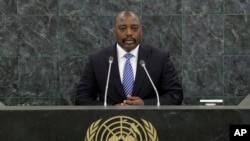Democratic Republic of Congo President Joseph Kabila has pledged to create a unity government to help stabilize the volatile country.
In a speech before parliament on Wednesday, he said the unity government "would soon be in place" and would include members of the opposition and civil society.
The president said he would take action on more than 600 recommendations that were drafted by government, opposition and civil society members who wrapped up three weeks of talks earlier this month.
He said his government's priorities would include restoring peace and improving the living conditions of citizens.
The DRC ranks near the bottom of the U.N. human development index. Eastern provinces have endured years of conflict that have displaced millions of people.
In his wide-ranging speech, Kabila also voiced frustration over the slow pace of peace talks between his government and the M23 rebel group.
On Monday, U.N. diplomats said the talks in neighboring Uganda had stalled. Negotiators said the two sides had reached agreement on several points but remained apart over proposed amnesty for the rebels.
M23 consists of rebel fighters who joined the Congolese army in a 2009 peace deal but later defected after complaining of poor treatment. Last year, the group took over territory in North Kivu province.
Kabila was re-elected in 2011 over opposition leader Etienne Tshisekedi.
However, a U.S.-based election monitor said the integrity of the polling had been "compromised" and that the true results may never be known.
In a 2012 report, the Carter Center said because of disorganization during and after the polling, it was impossible for the Congo's election commission to reconstruct the election results and produce a "faithful record of the will of the people."
In a speech before parliament on Wednesday, he said the unity government "would soon be in place" and would include members of the opposition and civil society.
The president said he would take action on more than 600 recommendations that were drafted by government, opposition and civil society members who wrapped up three weeks of talks earlier this month.
He said his government's priorities would include restoring peace and improving the living conditions of citizens.
The DRC ranks near the bottom of the U.N. human development index. Eastern provinces have endured years of conflict that have displaced millions of people.
In his wide-ranging speech, Kabila also voiced frustration over the slow pace of peace talks between his government and the M23 rebel group.
On Monday, U.N. diplomats said the talks in neighboring Uganda had stalled. Negotiators said the two sides had reached agreement on several points but remained apart over proposed amnesty for the rebels.
M23 consists of rebel fighters who joined the Congolese army in a 2009 peace deal but later defected after complaining of poor treatment. Last year, the group took over territory in North Kivu province.
Kabila was re-elected in 2011 over opposition leader Etienne Tshisekedi.
However, a U.S.-based election monitor said the integrity of the polling had been "compromised" and that the true results may never be known.
In a 2012 report, the Carter Center said because of disorganization during and after the polling, it was impossible for the Congo's election commission to reconstruct the election results and produce a "faithful record of the will of the people."





